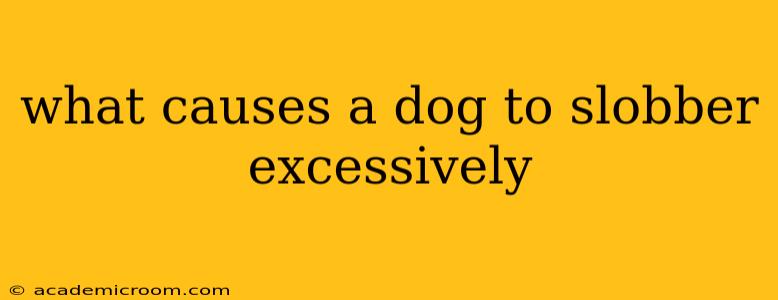Excessive drooling, or ptyalism, in dogs is a common problem that can stem from a variety of causes. While a little drool is normal, especially in breeds prone to it, excessive drooling can indicate an underlying issue requiring veterinary attention. Understanding the potential causes can help you address the problem effectively and ensure your canine companion's well-being.
Why Does My Dog Drool So Much?
Several factors contribute to excessive drooling in dogs. These range from completely harmless to serious medical conditions. Let's explore some of the most common culprits:
Breed Predisposition
Certain dog breeds are simply more prone to drooling than others. These breeds often have loose jowls or a predisposition to producing more saliva. Examples include:
- Mastiffs: Known for their substantial jowls and tendency to drool.
- Saint Bernards: Another breed famous for their drool.
- Bloodhounds: Their distinctive facial features contribute to saliva build-up.
- Great Danes: Their size and facial structure often lead to excessive drooling.
- Newfoundlands: These gentle giants are also known for their drool.
If your dog belongs to one of these breeds, excessive drooling might be entirely normal. However, a sudden increase in drooling should still be monitored.
Excitement or Anxiety
Just like humans, dogs can drool when they are excited, anxious, or stressed. Anticipation of a walk, a treat, or even a car ride can trigger increased saliva production. This is usually temporary and resolves once the exciting event is over.
Nausea or Gastrointestinal Upset
Stomach issues can cause your dog to produce extra saliva. If your dog is experiencing nausea, vomiting, or diarrhea alongside excessive drooling, it's crucial to consult a veterinarian. This could indicate a gastrointestinal problem requiring treatment.
Oral Issues
Problems within the mouth, such as:
- Dental disease: Infected teeth, gum disease, or other oral infections can cause pain and discomfort, leading to increased drooling.
- Mouth sores or ulcers: These can be painful and stimulate excessive saliva production.
- Foreign objects: Something lodged in the mouth can irritate the tissues and cause drooling.
Regular dental check-ups are vital to prevent dental disease and its related problems.
Medical Conditions
Several medical conditions can cause excessive drooling. These include:
- Kidney disease: Kidney problems can lead to an imbalance of electrolytes, resulting in increased saliva production.
- Rabies: While rare in vaccinated dogs, rabies can cause excessive drooling alongside other neurological symptoms. This is a medical emergency requiring immediate veterinary attention.
- Certain neurological disorders: Conditions affecting the nervous system can sometimes impact saliva control.
- Poisoning: Ingestion of certain toxins can trigger excessive drooling as a symptom.
These conditions require immediate veterinary attention.
Medications
Some medications can have excessive drooling as a side effect. If you've recently started your dog on new medication and notice increased drooling, consult your veterinarian.
Is My Dog's Drooling a Cause for Concern?
While breed predisposition and excitement are typically harmless, a sudden increase in drooling, especially accompanied by other symptoms like vomiting, lethargy, or changes in behavior, warrants a veterinary visit. Early diagnosis and treatment are crucial for managing underlying health issues.
When to See a Vet
It's best to err on the side of caution. Consult your veterinarian if you notice:
- A sudden and significant increase in drooling.
- Drooling accompanied by other symptoms such as vomiting, diarrhea, lethargy, changes in appetite, or behavioral changes.
- Persistent or chronic excessive drooling.
Your veterinarian can perform a thorough examination to determine the underlying cause of your dog's excessive drooling and recommend appropriate treatment. Don't hesitate to seek professional help to ensure your furry friend's health and happiness.
